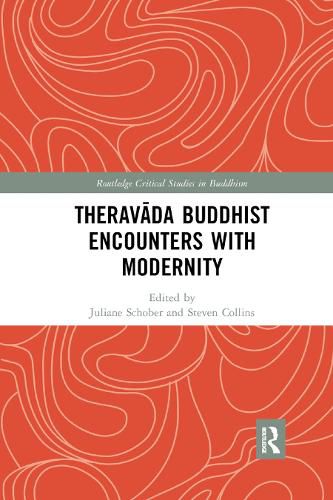Readings Newsletter
Become a Readings Member to make your shopping experience even easier.
Sign in or sign up for free!
You’re not far away from qualifying for FREE standard shipping within Australia
You’ve qualified for FREE standard shipping within Australia
The cart is loading…






Although recent scholarship has shown that the term ‘Theravada’ in the familiar modern sense is a nineteenth- and twentieth-century construct, it is now used to refer to the more than 150 million people around the world who practice that form of Buddhism. Buddhist practices such as meditation, amulets, and merit making rituals have always been inseparable from the social formations that give rise to them, their authorizing discourses and the hegemonic relations they create.
This book is composed of chapters written by established scholars in Buddhist studies who represent diverse disciplinary approaches from art history, religious studies, history and ethnography. It explores the historical forces, both external to and within the tradition of Theravada Buddhism and discusses how modern forms of Buddhist practice have emerged in South and Southeast Asia, in case studies from Nepal to Sri Lanka, Burma, Cambodia and Southwest China. Specific studies contextualize general trends and draw on practices, institutions, and communities that have been identified with this civilizational tradition throughout its extensive history and across a highly diverse cultural geography.
This book foreground diverse responses among Theravadins to the encroaching challenges of modern life ways, communications, and political organizations, and will be of interest to scholars of Asian Religion, Buddhism and South and Southeast Asian Studies.
$9.00 standard shipping within Australia
FREE standard shipping within Australia for orders over $100.00
Express & International shipping calculated at checkout
Although recent scholarship has shown that the term ‘Theravada’ in the familiar modern sense is a nineteenth- and twentieth-century construct, it is now used to refer to the more than 150 million people around the world who practice that form of Buddhism. Buddhist practices such as meditation, amulets, and merit making rituals have always been inseparable from the social formations that give rise to them, their authorizing discourses and the hegemonic relations they create.
This book is composed of chapters written by established scholars in Buddhist studies who represent diverse disciplinary approaches from art history, religious studies, history and ethnography. It explores the historical forces, both external to and within the tradition of Theravada Buddhism and discusses how modern forms of Buddhist practice have emerged in South and Southeast Asia, in case studies from Nepal to Sri Lanka, Burma, Cambodia and Southwest China. Specific studies contextualize general trends and draw on practices, institutions, and communities that have been identified with this civilizational tradition throughout its extensive history and across a highly diverse cultural geography.
This book foreground diverse responses among Theravadins to the encroaching challenges of modern life ways, communications, and political organizations, and will be of interest to scholars of Asian Religion, Buddhism and South and Southeast Asian Studies.